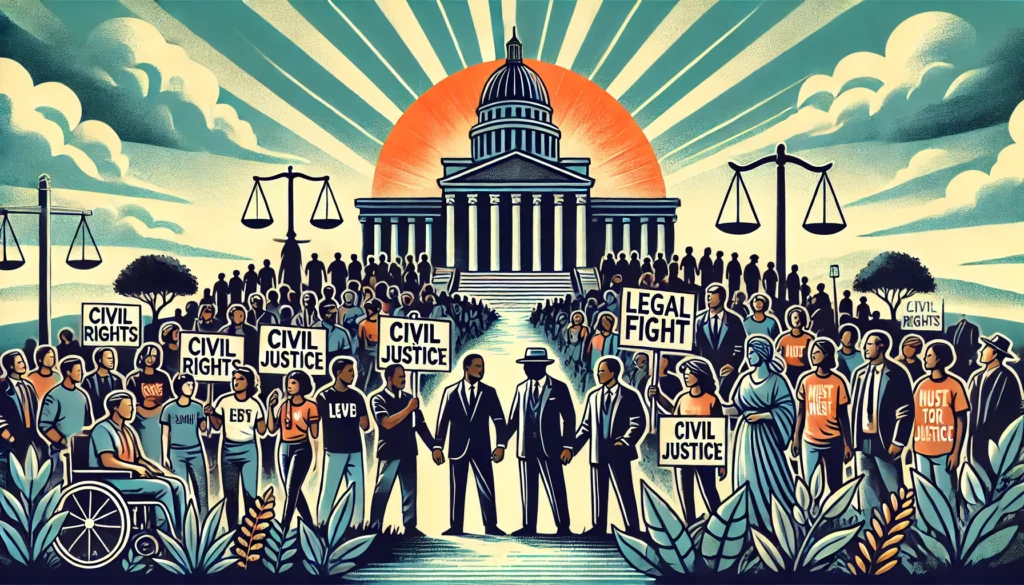Civil rights are the fundamental freedoms and rights guaranteed to every individual—regardless of race, gender, religion, nationality, or background. These rights protect people from unfair treatment, discrimination, and oppression. Justice, on the other hand, ensures that the law is applied equally and fairly to everyone.
Together, civil rights and justice are essential pillars of a free and democratic society. They ensure that every person has the opportunity to live with dignity, access equal opportunities, and have their voice heard.
A Brief History of Civil Rights Movements
Throughout history, people have fought to claim and defend their rights:
- United States Civil Rights Movement (1950s–1960s): Led by icons like Martin Luther King Jr. and Rosa Parks, this movement fought against racial segregation and discrimination.
- Women’s Rights Movement: Advocated for voting rights, workplace equality, and reproductive rights.
- LGBTQ+ Rights Movement: Fought for the recognition and legal protection of sexual and gender identities.
- Global Civil Rights Movements: Countries around the world have witnessed their own struggles against colonialism, racism, and inequality.
These movements have shaped laws and cultures, helping build a more just society.
Why Civil Rights Matter Today
Even today, civil rights continue to play a vital role in ensuring:
- Equal access to education, employment, and healthcare
- Freedom of speech, religion, and peaceful protest
- Protection against discrimination based on race, gender, or identity
- Justice in law enforcement and the legal system
Civil rights are not just history—they are an ongoing fight to make societies more inclusive and fair.
The Role of Justice in Upholding Civil Rights
Justice is about making sure everyone is treated equally under the law. It means:
- Investigating and punishing crimes fairly
- Providing equal access to legal representation
- Ensuring fair trials and impartial judges
- Reforming systems that reinforce inequality (e.g., police, prisons, education)
Without justice, civil rights cannot be truly protected or enforced.
Challenges Facing Civil Rights and Justice Today
Despite progress, many challenges remain:
- Systemic Racism and Discrimination: Still affects marginalized communities in housing, employment, and criminal justice.
- Voter Suppression: Laws and practices that make it harder for some people to vote.
- Police Brutality: Disproportionately affects people of color.
- Gender and LGBTQ+ Inequality: Unequal treatment in healthcare, education, and workplaces.
Recognizing these issues is the first step toward change.
How Individuals Can Support Civil Rights and Justice
You don’t have to be a lawyer or activist to make a difference. Here are some ways to help:
- Educate yourself about civil rights history and current issues.
- Speak up against injustice in your community.
- Support organizations working for equality and reform.
- Vote in elections to support fair and just leaders and laws.
- Listen and amplify voices from marginalized communities.
Small actions can lead to big change when done collectively.
FAQ’s
What are civil rights, and why are they important?
Civil rights are the basic freedoms and protections that every individual is entitled to, such as freedom of speech, equality before the law, and protection against discrimination. They are important because they ensure fairness, dignity, and equal opportunities for all.
How is justice related to civil rights?
Justice ensures that civil rights are upheld and protected through fair laws, unbiased legal systems, and equal treatment under the law. Without justice, civil rights cannot be effectively enforced.
What is an example of a civil rights violation?
Examples include racial discrimination in hiring, denial of voting rights, police brutality, or refusing services based on religion, gender, or disability. These violate the legal protections granted to individuals.
How can individuals protect their civil rights?
By staying informed, knowing their legal rights, reporting violations, supporting civil rights organizations, and participating in civic duties like voting, individuals can actively defend and protect their rights.
Why are civil rights still a concern today?
Even with legal protections in place, many groups still face discrimination, unequal access to resources, and systemic injustices. Ongoing efforts are needed to ensure these rights are truly upheld for everyone.
What is the role of the government in civil rights protection?
Governments create laws, enforce them through agencies and courts, and must ensure that civil rights violations are addressed. They also have the responsibility to educate the public and promote equality.
Which organizations work to promote civil rights and justice?
Groups like the ACLU, NAACP, Human Rights Watch, Amnesty International, and local advocacy centers work to protect and promote civil rights globally and locally.
How can students and youth get involved in civil rights efforts?
Students can join school clubs, participate in peaceful protests, volunteer with advocacy groups, educate their peers, and use social media to raise awareness about civil rights issues.
Conclusion: A Call to Action
Civil rights and justice are not just legal terms—they are values we live by. They affect how we treat each other, how we build our societies, and how we protect the freedoms of every individual.
By staying informed, speaking up, and standing together, we can continue the work of generations before us and create a future rooted in equality, fairness, and human dignity.



